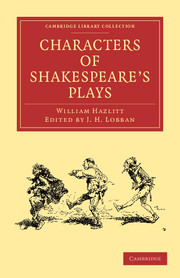Book contents
- Frontmatter
- Preface
- Contents
- Introduction
- Preface
- Cymbeline
- Macbeth
- Julius Cæsar
- Othello
- Timon of Athens
- Coriolanus
- Troilus and Cressida
- Antony and Cleopatra
- Hamlet
- The Tempest
- The Midsummer Night's Dream
- Romeo and Juliet
- Lear
- Richard II
- Henry IV
- Henry V
- Henry VI
- Richard III
- Henry VIII
- King John
- Twelfth Night; or, what you will
- The Two Gentlemen of Verona
- The Merchant of Venice
- The Winter's Tale
- All's Well That Ends Well
- Love's Labour's Lost
- Much Ado About Nothing
- As You Like It
- The Taming of the Shrew
- Measure for Measure
- The Merry Wives of Windsor
- The Comedy of Errors
- Doubtful plays of Shakespear
- Poems and Sonnets
- Notes
Measure for Measure
Published online by Cambridge University Press: 07 September 2010
- Frontmatter
- Preface
- Contents
- Introduction
- Preface
- Cymbeline
- Macbeth
- Julius Cæsar
- Othello
- Timon of Athens
- Coriolanus
- Troilus and Cressida
- Antony and Cleopatra
- Hamlet
- The Tempest
- The Midsummer Night's Dream
- Romeo and Juliet
- Lear
- Richard II
- Henry IV
- Henry V
- Henry VI
- Richard III
- Henry VIII
- King John
- Twelfth Night; or, what you will
- The Two Gentlemen of Verona
- The Merchant of Venice
- The Winter's Tale
- All's Well That Ends Well
- Love's Labour's Lost
- Much Ado About Nothing
- As You Like It
- The Taming of the Shrew
- Measure for Measure
- The Merry Wives of Windsor
- The Comedy of Errors
- Doubtful plays of Shakespear
- Poems and Sonnets
- Notes
Summary
This is a play as full of genius as it is of wisdom. Yet there is an original sin in the nature of the subject, which prevents us from taking a cordial interest in it. “The height of moral argument” which the author has maintained in the intervals of passion or blended with the more powerful impulses of nature, is hardly surpassed in any of his plays. But there is in general a want of passion; the affections are at a stand; our sympathies are repulsed and defeated in all directions. The only passion which influences the story is that of Angelo; and yet he seems to have a much greater passion for hypocrisy than for his mistress. Neither are we greatly enamoured of Isabella's rigid chastity, though she could not act otherwise than she did. We do not feel the same confidence in the virtue that is “sublimely good” at another's expense, as if it had been put to some less disinterested trial. As to the Duke, who makes a very imposing and mysterious stage-character, he is more absorbed in his own plots and gravity than anxious for the welfare of the state; more tenacious of his own character than attentive to the feelings and apprehensions of others. Claudio is the only person who feels naturally; and yet he is placed in circumstances of distress which almost preclude the wish for his deliverance.
- Type
- Chapter
- Information
- Characters of Shakespeare's Plays , pp. 239 - 243Publisher: Cambridge University PressPrint publication year: 2009First published in: 1908

